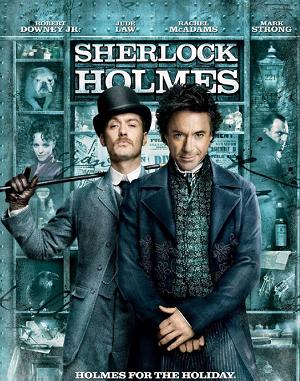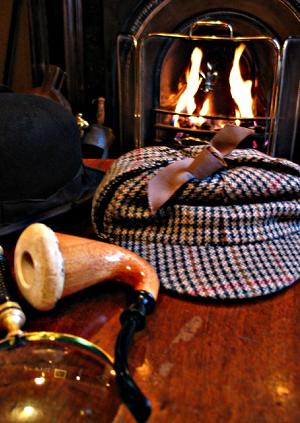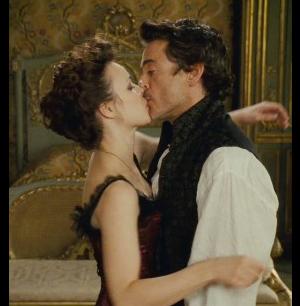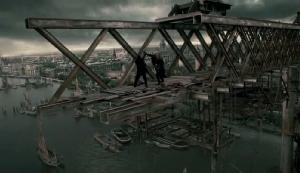Movie Review: Sherlock Holmes (2009)
 | | Sherlock Holmes? |
Sherlock Holmes is one of the greatest literary figures who inspired me as a child. He instilled in me a respect for logic and skepticism, a love of mystery, and an appreciation for eccentricity. I grew up reading his many adventures, and this was in no small part thanks to my father, who is best described as a Sherlock Holmes superfan. Therefore, it was with great trepidation that I sat down and watched the recent film "reboot," Sherlock Holmes, directed by Guy Ritchie and starring Robert Downey, Jr. in the lead role. I am not averse to the idea of taking a fresh approach to the character and his stories and pulling our collective impression of the man away from the Basil Rathbone charicature, but this film seems to be trying to turn Holmes into a manic-depressive action hero instead of the eccentric supersleuth Conan Doyle created.
There are a few things the movie gets right. The interplay between Holmes and Watson is more interesting than it usually is on film, and there are plenty of references to the original stories, from the obscure to the obvious. Some of the best lines of dialogue in the movie are ripped right out of Conan Doyle's works, as in "One begins to twist facts to suit theories, instead of theories to suit facts" (which comes from "A Scandal in Bohemia") and "Crime is common, logic is rare" ("The Adventure of the Copper Beeches").
Still, despite these homages, the writers are all too eager to distance their characters from Conan Doyle's. While the literary Holmes is trained in boxing and fencing, he is never the brawny martial arts master who twirls nightsticks like nunchucks and plans out how to stealthily incapacitate targets with well-placed blows. The Holmes in this movie is more like Batman or Jack Bauer in these moments, and while I love Batman and Jack Bauer, that is not Sherlock Holmes. Additionally, Robert Downey plays the character with far too much crazy, taking Holmes from an eccentric genius into a dysfunctional and certifiable lunatic who uses drugs far more frequently and recreationally than the literary Holmes ever did.
 | | Imagine Sherlock Holmes without a deerstalker, and all you're thinking about is nothing |
Which brings me to the deerstalker cap worn by nearly every film iteration of Sherlock Holmes except this one. Director Guy Ritchie has mentioned this distinctive piece of clothing, but has implied that it is an invention created purely on film and is never mentioned in the Sherlock Holmes stories. This is simply not true. While the word "deerstalker" never appears in Conan Doyle's work, in "The Adventure of Silver Blaze," Holmes is described wearing a "ear-flapped travelling cap," and in "The Boscombe Valley Mystery," he is described wearing "a close-fitting cloth cap." You'd be hard-pressed to find anything other than a deerstalker cap that matches those descriptions in the time period of those stories. Additionally, many of the original illustrations for the Sherlock Holmes stories by Sidney Paget and Frederic Dorr Steele, approved by Conan Doyle himself, have Holmes wearing a deerstalker cap. In short, depicting Sherlock Holmes without his iconic hat is like depicting Indiana Jones without his beat-up fedora.
The bottom line is this: if you're going to make a movie about Sherlock Holmes--and even go so far as to name the movie Sherlock Holmes--the movie should be about Sherlock Holmes, a well-established and rich character who is most definitely not some half-crazed Batman-hybrid with deliberate exagerrations and omissions. You would also be wise to cast somebody who is not as distinctively American as Robert Downey, Jr. Granted, his accent is excellent, but you simply can't look at him and be sold on the fact that he's supposed to be British.
Other things will annoy the Sherlock Holmes purist as well. The inclusion of Irene Adler is part of an obvious Hollywood-style formula where heroes must always have love interests, and Rachel McAdams plays her all wrong at any rate. And finally, the mystery doesn't have a simple explanation, favoring an elaborate and scientifically questionable conspiracy theory to one where simple clues can lead you to a clever and satisfying solution.
 | | Pictured: blasphemy |
Even divorcing the story from Sherlock Holmes, there is an element near the end of the story that is infuriatingly nonsensical. **SPOILER ALERT!** In the villain's final act, he decides to detonate a chemical weapon using a remote trigger that is surprisingly similar to a cell-phone. The problem I have with this--aside from how silly and absurd it is--is that it is completely unnecessary. His plan involves this chemical weapon going off at a very specific time, so a timer would have worked much better than a technology that is a hundred years ahead of its time. Plus, we find out that the villain-behind-the-villain (who is, predictably enough, Professor Moriarty) had the sole motivation of getting his hands on this technology, though it is never explained how he knew about it and why he would need to create such an elaborate scheme to acquire it. **END OF SPOILERS**
But, okay, let's say you just want to see an action movie set in late Nineteenth-Century London and you don't care about Sherlock Holmes. Does this movie deliver for you? Possibly.
The action beats can be fun and entertaining, and Robert Downey's antics are amusing. The set pieces are huge and elaborate, especially the climactic, still under construction Tower Bridge. At the very least, it is easy to see that the cast and crew are having fun, even though the drab color scheme gets depressing after the first twenty minutes or so. Fans of Guy Ritchie's cinematic style will be happy with the fight scenes, which are all reminiscent of Ritchie's better works, Snatch and Lock, Stock, and Two Smoking Barrels. However, Ritchie wisely tones it down throughout much of the rest of the movie, only getting carried away during one particularly disorienting drug montage late in the film.
 | | Silly, but impressive |
Unfortunately, even though Ritchie and Downey are obviously having fun, the movie still feels tedious and uninteresting. If a good mystery movie involves having clues that the audience can pick out and use, Sherlock Holmes is not a good mystery movie. The few clues given to the audience are nearly all given in one scene, and they mostly require an advanced technical knowledge of chemistry that isn't necessarily accurate along with some Dan Brown levels of conspiracy thinking. It is fun to see Holmes explain the mysteries away near the end, but it isn't as satisfying as a good mystery should be.
So, all in all, I most definitely do not recommend Sherlock Holmes, and I hope the sequel derails before it goes into pre-production. There are better action movies out there, just as there are better mystery movies. Fans of the source material should be borderline offended with how far this film departs from Conan Doyle, and fans of Guy Ritchie should spend more time anxiously awaiting the next RocknRolla than a sequel to this disastrous monstrosity of a movie. And if you'd like to see a clever modern reinterpretation of Sherlock Holmes, just watch a few episodes of House, M.D..
FINAL SCORE:





I would love to see a new version of Sherlock Holmes, but this movie is just plain awful.
|
-e. magill 5/18/2010
|
|